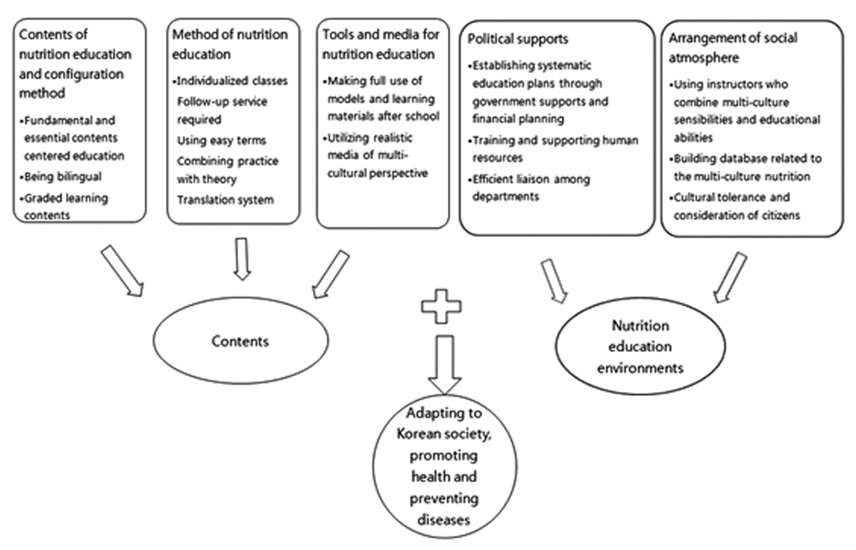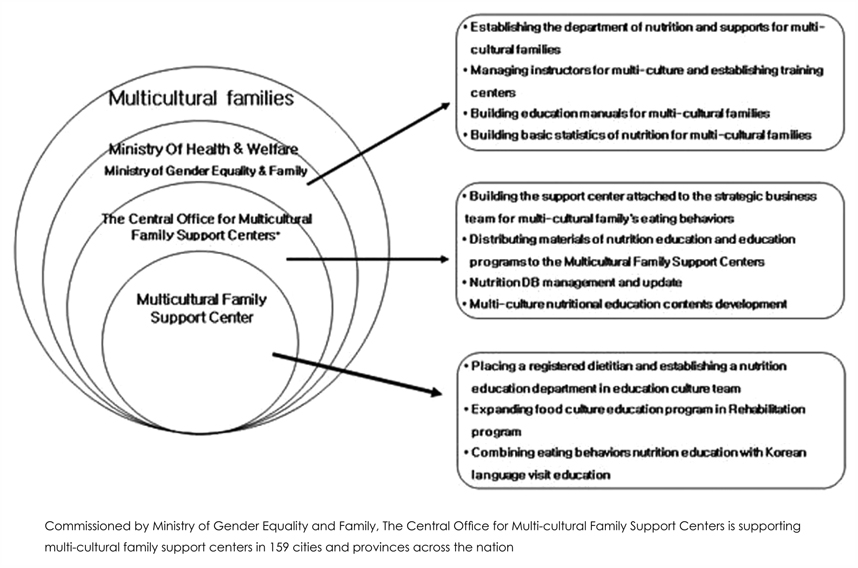Korean J Nutr.
2011 Aug;44(4):312-325. 10.4163/kjn.2011.44.4.312.
Nutrition Education for Female Immigrants in Multicultural Families Using a Multicultural Approach: In-depth Interviews with Female Immigrants and Nutrition Education Professionals
- Affiliations
-
- 1The Graduate School of Clinical Health Sciences, Ewha Womans University, Seoul 120-150, Korea.
- 2Department of Food and Nutritional Sciences, Hanbuk University, Dongducheon 483-777, Korea.
- 3Department of Nutritional Sciences & Food Management, Ewha Womans University, Seoul 120-150, Korea. seo@ewha.ac.kr
- KMID: 2268547
- DOI: http://doi.org/10.4163/kjn.2011.44.4.312
Abstract
- The purpose of this study was to investigate dietary behaviors and nutritional knowledge among immigrant women in multicultural families. In addition, this study reveals a necessity for nutrition education, which is apparent to both immigrant women living in multicultural families as well as nutrition education experts. The survey was conducted with 30 immigrant women within multicultural families in Seoul. The dietary behaviors of the women were significantly different by their period of residence. The longer they had resided in Korea, the higher their dietary behavior score. However, there was no significant difference in nutrition knowledge by their period of residence. This study also conducted in-depth personal interviews with 8 immigrant women who lived in Seoul, and with 4 nutrition education experts. These interviews were performed to provide profound insights regarding the content and means of nutrition education for immigrant women. Nutrition education for immigrant women living in multicultural families should proceed at a basic level in terms of language and content, using bilingual (Korean and their native language) education materials. Education topics and content need to be developed differently according to the level of Korean comprehension and period of residence in Korea. Also, this multicultural approach should be adapted when planning nutrition education since immigrant women have various acculturation levels, and the content and means of education should be adjusted to these acculturation levels. Management after nutrition education is necessary for immigrant women who do not have sufficient understanding of the Korean language. Practical educational methods such as real cooking practices and food purchasing simulations must be developed. Finally, the results suggest that the government needs to establish a systematic plan for nutrition education among immigrant women living in multicultural families. Policy support such as training nutrition educators on multicultural individuals residing in Korea is necessary for active and effective nutritional education.
Keyword
Figure
Cited by 3 articles
-
Food adaptation and nutrient intake of female immigrants into Korea through marriage
Ji-Myung Kim, Hee Seung Lee, Min Hwa Kim
Korean J Nutr. 2012;45(2):159-169. doi: 10.4163/kjn.2012.45.2.159.Dietary behaviors of female marriage immigrants residing in Gwangju, Korea
Eun Ju Yang
J Nutr Health. 2016;49(3):179-188. doi: 10.4163/jnh.2016.49.3.179.Food intake and nutritional status of female marriage immigrants residing in Gwangju, Korea
Eun Ju Yang, Jin Mo Khil
J Nutr Health. 2016;49(5):358-366. doi: 10.4163/jnh.2016.49.5.358.
Reference
-
1. Immigrant nationality residence status. Korea Immigration Service. 2010. 09. 30. Available from: http://immigration.go.kr.2. Seo JN. Multicultural families by international marriage: Contemplation on present issues for possible solution. Theory Res Citizsh Educ. 2009. 42(1):103–126.3. Park YI. A study on multi-cultural family wives adapting to Korean cuisine and dietary patterns [Master thesis]. 2009. Seoul: Sookmyung Women's University.4. Kim SH, Kim WY, Lyu JE, Chung HW, Hwang JY. Dietary intakes and eating behaviors of Vietnamese female immigrants to Korea through marriage and Korean spouses and correlations of their diets. Korean J Community Nutr. 2009. 14(1):22–30.5. Kim JM, Lee NH. Analysis of the dietary life of immigrant women from multicultural families in the Daegu area. J Korean Diet Assoc. 2009. 15(4):405–418.6. Seels BB, Richey RC. Instructional technology: The definition and domains of the field, translated from English to Korean by Y.S. Kim, et. al. 1996. Paju: Kyoyookbook.7. Ministry of Health and Welfare. Nutrition plus program source book: Supplemental nutrition program for women, infants, and children. 2008.8. Hwang KA. Study on eating habits, understanding and insight on nutrition labeling of elementary school students [Master thesis]. 2010. Daegu: Keimyung University.9. Gany F, Thiel de Bocanegra H. Maternal-child immigrant health training: changing knowledge and attitudes to improve health care delivery. Patient Educ Couns. 1996. 27(1):23–31.
Article10. Jo SY. The study on nursing intervention about delirium of elder patients admitted ICU: Focus group interview analysis [Master thesis]. 2010. Seoul: Korea University.11. Han YH. Influential factor on Korean dietary life and eating behaviour of female marriage immigrants [Master thesis] . 2010. Seoul: Hanyang University.12. Banks JA. An introduction to multicultural education. 2002. 3rd ed. Boston: Allyn & Bacon.13. Pang V. Multicultural education: A caring - Centered, reflective approach. 2004. 2nd ed. New York: McGraw-Hill.14. Kruger S. Prevention of delirium in hospitalized older patients: Risk factors and targeted intervention strategies. 2000. New York: Bronx.15. Kang IJ. A survey on nutrition knowledge and dietary life of women in multi-cultural families [Master thesis]. 2010. Gyeongsan: Yeungnam University.16. Park HW, Moon ST. Analysis on the actual condition of female immigrants in rural area for social adjustment education. J Argic Educ Hum Resour Dev. 2008. 40(2):69–91.
Article17. Kim HJ. Government-led multicultralism in Korea: multicultrualism thoeries and domestic application. In multicultralism in Korea: Reality and issues. 2008. Seoul: Hanul Academy.18. He J, Klag MJ, Wu Z, Qian MC, Chen JY, MO PS, He QO, Whelton PK. Effect of migration and related environmental changes on serum lipid levels in southwestern Chinese men. Am J Epidemiol. 1996. 144(9):839–848.
Article19. Kim KS. A study on the realities of child education in a multi-cultural family in Korea [Master thesis]. 2006. Seoul: Seoul National University.20. Ministry of Education, Science and Technology. Report on the school food service status for accessing improvement measures. 2003.21. Bennett CI. Comprehensive multicultural education: Theory & practice. 1998. 4th ed. New York: Allyn & Bacon.22. Jeon KS, Jeong KS, Lee JH. A study on multicultural education policies. 2007. Gyeonggi Provincial Office of Education, Gyeoggido Family & Women's Research Institute.
- Full Text Links
- Actions
-
Cited
- CITED
-
- Close
- Share
- Similar articles
-
- Qualitative Study on Improvement of Operating System and Tailored Nutrition Education Program for Marriage Immigrants to Korea: Program Providers' Perspective
- Diet-related Behaviors, Perception and Food Preferences of Multicultural Families with Vietnamese Wives
- Development of Nutrition Education Program for Vietnamese Female Marriage Immigrants in Korea Based on the Health Belief Model
- Factors Affecting Scaling Experiences of Adolescent Children from Multicultural and Native Families
- Analysis of the Dietary Life of Immigrant Women from Multicultural Families in the Daegu Area



